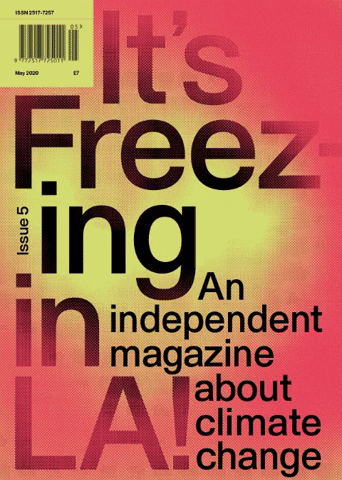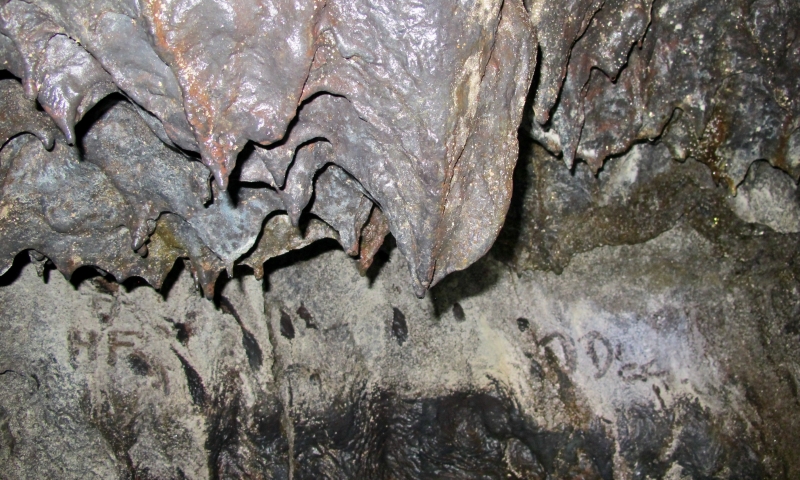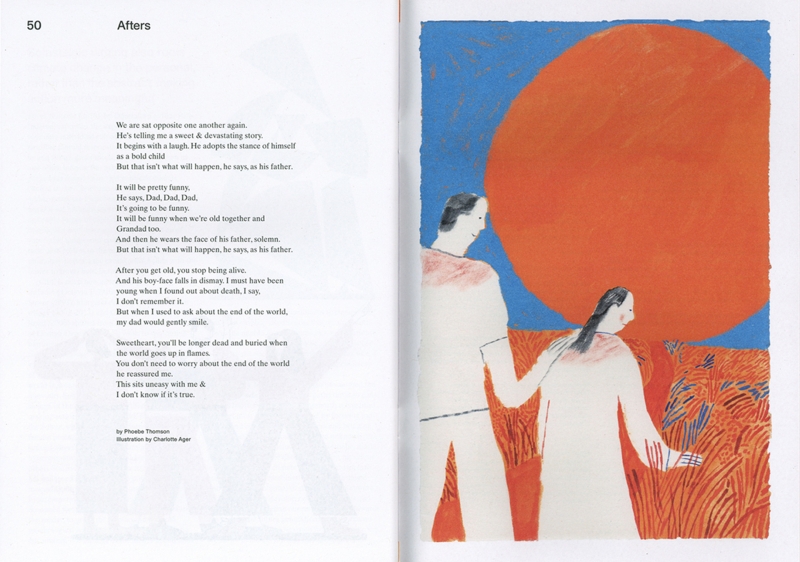There are no unsacred places;
There are only sacred places
And desecrated places.
Wendell Berry
In the summer of 2015, my boyfriend and I went camping in Wales, during what turned out to be the hottest days of the year. We began by swimming in an old slate quarry in the village of Friog, just south of Barmouth, and just inland from Fairbourne. You climb a hill, the slate slippery underfoot, pass under an old slate bridge. Mining equipment rusts away to orange. At the top of the hill you pass through a low tunnel, in which the railway tracks still run along the bottom. At the end you come out into the quarry: a deep basin reaching far above your head, and below, ice-cold and shockingly clear water, a deep antarctic blue. We stayed there for an afternoon – local kids turned up and got drunk on the other side, some people in wetsuits went quickly in and out of the water. I saw my first slowworm, like a bolt of metal, silently pouring itself behind a rock.
Golwern Quarry was opened in 1865, and was never particularly successful. Records from Coflein state that four men working in 1882 produced 50 tons of slate, the quarry worked “with hand dressing and an incline system to the road.” Later, it was turned into a pit accessed by tunnels, before being closed in 1915. The pit was filled to provide water for a mill. It’s difficult to work out when the Blue Lake, as it was known, became a swimming destination, but it was long before it became known to me.
The beginning of the end for the Blue Lake was when it was uploaded as a destination to TripAdvisor. The lake rapidly became a tourist destination, and the pressure of maintaining the site – dealing both with the death of a 17 year old in an accident and huge amounts of litter – led the landowner to block the tunnel in 2019, closing off access for good. The TripAdvisor page is now clogged with comments from people mourning its loss, and complaining about the behaviour of those who led to the site’s closure. A comment from indieworks titled “social media strikes again” reads: “been visiting this beautiful spot for years and was about to return when I discovered that access has been blocked. This is another example of the internet destroying things that are precious.”
✻
Wild swimming, in the mainstream, has been through its cycle of bloat and backlash: much effusiveness has been written on water’s life-giving, depression-curing properties, and some have written in response raising concerns about the fetishisation of nature, the pollution of popular spots, the absorption of something utterly normal for many people into a largely middle-class trend. Much of the literature surrounding wild swimming employs religious language: the New Yorker writes that the Hampstead ponds “inspire an almost cultlike devotion in their users”, while the LRB reviewing a book of essays on the same ponds notes that its writers “describe giving themselves over to something, a kind of sacrifice”. The image of the swimmer lends itself to the language of baptism, pilgrimage, purge, ritual: the water stripping away your personal anguishes and hang-ups. Swimming “takes you away from the world”: it lets you pretend at being non-human, as where Amy Liptrot imagines herself turning into a selkie in her memoir of swimming and alcoholism, The Outrun.
Wild swimming has become popular while retaining a suggestion of rebelliousness: the cheapness and ease of foreign travel has made it feel faintly radical, counter-cultural, for those who have the means and cultural cache to choose it. But the version of wild Britain that wild swimming facilitates — serene, ancient, righteous — depends on being the only, or one of a few, people to know about and to visit these spaces.
Recently a thread of thinking has emerged claiming that it is humanity that is the virus, that in the absence of human activity the earth is “healing”; there is graffiti near my house that reads “covid 19 is the cure”. This is problematic for several reasons, primarily as it implies that population control would reverse the effects of climate change (an idea that focuses on the spectre of over-populated “Third World” countries, instead of the mass-pollutant corporations and populations in the West). It also encourages the idea that ecologies are so robust that they simply need only be given the smallest opportunity and they will thrive, restoring the earth to its prelapsarian state. Adam Searle and Jonathon Turnbull write that “Finding relief in this falsified imaginary of resurgence in response to humanity’s confinement engenders political neutrality and inertia at a time when real ecological action is urgent… Resurgence, therefore, must be reinstated as an active multispecies labouring endeavour, brought about through an ethical commitment to the worlds we strive to maintain, support, and create.”
Wild swimming helps to create a relationship with those worlds. After all, those religious-sounding accounts have something right: swimming in wild water does often feel like a baptism, like being in bodily communication with something large and unknown, like ecstasy, particularly when combined with an inchoate sense of geographic ritual, of swimming in ancient waters. Yet how can you establish an ethics that derive from such an experience which does not rely on the idea of the wild as “over there”, the quarry pool at the end of a long drive? And how to honour an experience which feels personal and private yet which must be shared, particularly as ecological justice relies upon the involvement of everyone?
✻
Fairbourne is the larger village to Friog’s side that sits on the coast. The beach there is still lined with anti-tank defenses, trapezoid-shaped blocks that weigh one and a half tons. The inhabitants of Fairbourne are likely to be Britain’s first climate refugees, forced to flee rising sea levels. The Guardian states that “in 26 years – or sooner, if forecasts worsen or a storm breaches the sea defences – a taskforce led by Gwynedd council will begin to move the 850 residents of Fairbourne out of their homes. The whole village – houses, shops, roads, sewers, gas pipes and electricity pylons – will then be dismantled, turning the site back into a tidal salt marsh”. The people there will not receive compensation for the loss of their homes and community.
You do not need to travel far to find nature, and evidence of its entanglement in the human. In lockdown, I went to find a pond in my neighbourhood that came up on Google Maps as the Secret Lake. To get there you have to travel through an industrial estate: rotting mattresses, buddlia exploding out of the side of railings, seagulls wheeling over the household recycling centre. All of this compromised wildness draws bees and birds, more of which you see there by far than over the tidy lawns of the houses in Manchester’s wealthier areas, where I work. The lake is beautiful: lily pads, coots nesting, rushes, wildflowers. It’s also surrounded by islands of rubbish, piled up by makeshift bins and scattered all through the undergrowth. Things are growing through and between cans, plastic bags. Nature and pollution mirror each other’s practices, getting into everywhere. One day soon my friend and I are going to go with bin bags and litter pickers - one day, it might be clean enough to swim in.
To be clear, plastic and metal litter have destructive impacts on their environments; they pose harm to animals through injury or ingestion, and they leach chemicals into soil and water. But the point I am making is that our sense of ourselves and of nature are always so enmeshed; that nature exists like this here just like it does over there. Our ethics can include the pure and the profane both; can understand the extension of the human into the non-human not as pilgrimage but as exchange, one in which both parties act upon each other. Swimming, immersion in the other, enacts such an entangling, and presents a useful starting point from which to consider one’s role in the mesh; but it cannot be where engagement ends.
My brief time at the quarry, an experience which is now impossible to repeat, asks that it be honoured. This is what Kathleen Jamie calls “a kind of prayer”: “the web of our noticing, the paying heed”. In this case, it means amplifying the voices of the residents of Fairbourne, and insisting on the reality of catastrophic climate change, the inadequacy of our current emission-reducing ambitions.
The loss of the quarry pre-empts the loss of Fairbourne, which will happen if climate collapse continues to exist in the collective consciousness as something lingering on some foreign horizon, and if we generally continue to think of the natural as something pure, that needs nothing but to be left alone. A deeper understanding of the ways in which nature and human culture move upon each other helps in thinking through ways of adapting to anthropogenic climate change that do not call simply for withdrawal, or more ominously, for there to be fewer of us. Fairbourne’s MP, Liz Saville Roberts, said: “The easiest thing to do would be to keep my head down, save for the fact that that is the crux of the problem with our short-termism, our self-interest politics. Fairbourne is what a climate change emergency looks like.”
It is deeply sad that the quarry is closed, but the emergent narrative - that too many people having access to natural experience means that it will, inevitably, be ruined - is a dangerous one. More connection, not less, is required in order to establish a “multispecies labouring endeavour”, as Searle and Turnbull would have it. This also asks of us to prioritise “ethical commitment” over personal experience; even while personal experience can inform and make joyful such a commitment. In the end, we do not lose our humanity through immersion in water, but it might emerge as a more complicated thing; we are porous beings, like eggs. That might be a good place from which to begin.
Beachcomber and writer, based in Manchester, Nell Whittaker was one of the participants in Writing for a Substantially Altered World, an online climate literature workshop organised by the magazine It's Freezing in LA! and maat on the theme of Solastalgia.










